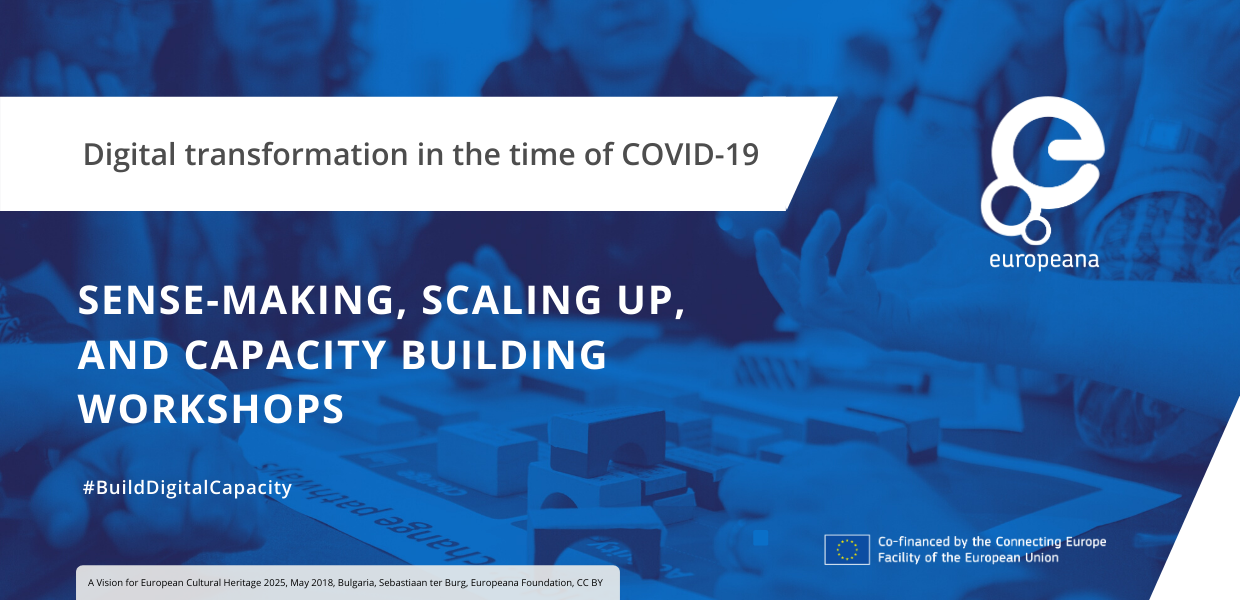Digital transformation in the time of COVID-19: preparation and action
Throughout June, Europeana is bringing together 60 cultural heritage professionals from across Europe for a special series of peer-to-peer workshops on ‘Digital transformation in the time of COVID-19’. In this post, one of the process’s facilitators, Michael Peter Edson, reflects on the second week of the workshops and discussions around the importance of preparation and the possibility of action.

- Title:
- A Vision for European Cultural Heritage 2025
- Creator:
- Sebastiaan Ter Burg
- Date:
- May 2018, Bulgaria
- Institution:
- Europeana Foundation
- Copyright:
- CC BY
In the first two weeks of our ‘Digital Transformation in the time of COVID-19’ workshops, we’ve discussed a variety of topics. We’ve heard about dramatic changes in work-from-home culture; inspirational projects from inside and outside the cultural sector; and challenges and changes in organisational thinking
In the first week alone I found over 40 different themes and sentiments running through our conversations, but one of the most profound observations to emerge so far has to do with the opportunity cost of this moment (the value of decisions made, and not made), and the need to begin change now, in whatever ‘now’ you’re in.
The importance of preparation
Last week we asked participants to reflect on this question: 'what do you know now that you wished you had known when the crisis began?' Many told us that if they had known early on how long this crisis would last, and how profound its disruptive potential would be, they would have taken action much sooner to initiate change.
‘We all knew about these things that we ought to have done,’ said one participant: others mentioned building a social media presence, forging relationships with audiences and collaborators, climate action, the digital divide, and building digital capacity across their whole organisations as work that was known to be important, but which never got done.
‘There were things we knew we had to address at some point, but we were all working on our regular tasks so we didn’t have time to do that,’ said another attendee.
And another added, ‘My organisation thought it was a digital organisation, but we didn’t realise how unprepared we were.’
Looking through my notes from the workshops, despite moments of optimism about the positive responses that have come out of the GLAM sector, I sense a feeling of regret among our colleagues regarding the cultural sector’s level of preparedness heading into the crisis and our ability to have an impact during The Great Shutdown and the global protests that have followed the killing of George Floyd.
But I don’t want to be all gloomy here. There’s a big upside as well.
The possibility of action
Another profound observation from the first two weeks of workshops has been an overwhelming sense that action seems possible now in ways that it never has before.
One participant told us of a senior curator who quickly created an online exhibition — the first for their museum — to connect with distant students and audiences when the museum closed.
We heard of admiration for small scale, often playful digital cultural initiatives and the fast, grass-roots mobilisation of local cultural and performing-arts institutions, creative artists, and libraries. Even the creativity and community-engagement shown by bookstores, bakeries, farmers, and other small businesses were found to be inspiring.
‘We are refocusing and reframing our work around things that did not seem to be possible before. We have realised that [the old rules] were not cut into stone,’ declared one workshop attendee last week.
And many others spoke of colleagues, departments, and even entire organisations that were able to pick themselves up and get remarkable and previously unimaginable work done together in a very short amount of time.
‘I learned that [my colleagues] are more digitally savvy than I thought they would be. I was hesitant at first, we have a very traditional organisation, but it happened very quickly,’ said one participant.
Another added that he would have ‘pushed a lot harder’, even before the COVID-19 crisis, if he had known how readily his colleagues would embrace digital change.
Reflecting further
These observations about opportunity cost, delay, and action are a lesson for all of us.
We all have our own lists of positive things we could be doing. We’ve been saying that GLAMs should use the Internet to create a better, more just, and more resilient society for as long as I’ve known what the Internet was, but day-to-day it’s easy to take a little more time to plan and consider things before we act.
Don’t get me wrong, thinking is good, but in times like this we can begin to see the value of beginning digital transformation — beginning all kinds of transformation — before a crisis is at hand.
Or as the old saying goes: 'The best time to plant a tree was 20 years ago, but the second-best time is now.'
Share your thoughts
These workshops have opened up important conversations and we welcome your thoughts. Tell us, what do you know now that you wished you had known when the crisis began? And what kinds of new actions are important to you?
Please share your thoughts on Twitter with the hashtag #BuildDigitalCapacity. Feel free to tag @Europeanaeu, @mpedson or @jaspervisser as well. Your insights and ideas will help us shape the conversations and outcomes of this process.
You can also sign up to stay up to date with the project.

